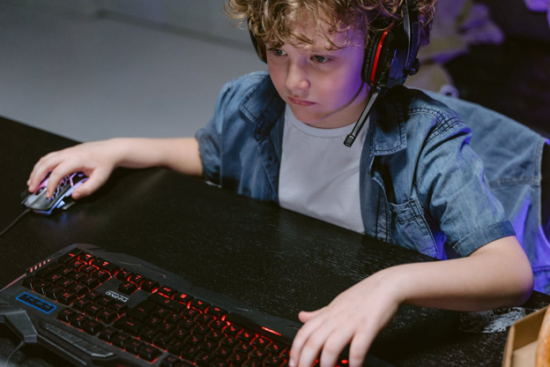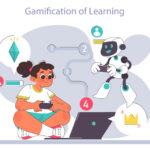Please welcome Andrew Olsen to 21st Century Tech Blog. Andrew works in the SEO space but in his off-hours, he is a gamer. He holds some of the top ten times for the Nintendo video game NES Speedrun. Andrew makes a good case for video games as skill-building and learning environments. He’s got me convinced and I hope you enjoy his contribution to the site.
Different Game Genres Enhance Real-Life Abilities
As the boundaries between the digital and the real world increasingly blur, the impact of the former on marketable skills is becoming more significant. Digital games today are not merely entertainment. They are also potent educational tools. Educators have even created a word for this method of learning. It is called gamification, which is defined as using games to improve learning engagement, problem-solving, and teamwork. Gamification is being integrated into education, healthcare, scientific research and business. This article explores how different game genres and specific games can enhance real-life skills.
Strategic Thinking Through Real-Time Strategy Games
Real-time strategy (RTS) games represent a genre that require players to juggle multiple tasks simultaneously under pressure. These games are ideal for developing and honing strategic thinking because they simulate complex environments where decisions may have immediate or long-term consequences. Players learn to manage resources and strategies in real-time, offering a perfect analogy for similar real-life strategic challenges.
Two RTS game examples are StarCraft II and Age of Empires. Both offer complex, multi-layered gameplay requiring quick thinking and strategic foresight. They leverage advanced AI and real-time processing to create challenging scenarios. Players face AI opponents who can rapidly adapt to strategies thrown at them. For the players, not the AI opponents, it is a dynamic environment to develop critical thinking and adaptive strategies.
The skills learned in playing RTS games transfer well to the real world of business management, military strategy and crisis response. Players lmanage resources efficiently, anticipate opponents’ moves, and make quick decisions.
For a practical application within a fantasy realm, RAID: Shadow Legends offers an excellent example of an RTS game that focuses on strategic resource management, and through onscreen tactical combat serves to enhance planning skills.
Problem-solving and Puzzle Games
Puzzle games are uniquely designed to challenge our intelligence. They make players approach problems from different angles, fostering mindsets that are both flexible and analytical. Two examples of puzzle games are Portal and Tetris Effect. Both use advanced algorithms in puzzles that require logical reasoning, spatial awareness, and pattern recognition. They employ physics-based mechanics that entertain, educate, and improve mental capabilities.
Playing puzzle games enhances one’s ability to analyze data, structure projects, and navigate complex issues in professional settings. The cognitive skills learned are especially useful for real-world fields requiring high levels of analytical thinking and innovation including engineering, computer programming, and scientific research.
Role Playing Games and Social Skills Development
Massively multiplayer online role-playing games or MMORPGs are virtual playgrounds where players interact in persistent and expansive worlds. These games are powerful platforms that mimic the complexities of real-world social interactions. Participating in digital societies develops interpersonal skills that are transferable to the real world. Two examples of these games are World of Warcraft and Eve Online. Both create social communities where players collaborate to achieve common goals. These games have been able to achieve their success because of the evolution of high-speed, high-bandwidth networks that facilitate real-time communication and interaction for thousands of players to engage each other worldwide. Through these types of role-playing games set in virtual worlds and societies, players learn to negotiate, collaborate, and lead, providing a training ground for managing real-life group dynamics.
Shooter Games Teach Quick Thinking and Reactions
First-person shooters or FPS games are high-octane, demanding virtual worlds where players make rapid decisions and hone their psychomotor skills. FPS games’ immersive and fast-paced nature is ideal for developing critical skills associated with high-stress jobs. Call of Duty and Overwatch are two fast-paced demanding action games that improve hand-eye coordination, reflexes, and split-second decision-making. They use high-frame-rate graphics and responsive control systems to simulate real-time engagements. They have practical applications for jobs like driving, piloting, and medicine.
Sandbox Games Encourage Creativity
Sandbox games feature open-world experiences where creativity is encouraged and required. These games are about exploration without defined goals. Players can manipulate the virtual environment and create complex structures and systems from scratch. They serve as a canvas for innovation and experimentation, providing players with the tools to think creatively and problem-solve. They feature open-ended play. Minecraft and The Sims are these types of games, digital sandboxes that allow players to test and implement ideas without real-world constraints.
Narrative Games Improve Emotional Intelligence
Narrative games are about storytelling. They promote character development and offer players a deeply emotional and ethical landscape in which to play. They feature situations where characters face difficult decisions, mirroring real-life scenarios that require empathy and emotional insight. The Last of Us and Life is Strange are two narrative games that challenge players to make moral decisions, build relationships, and enhance empathy and emotional intelligence. These can be invaluable in professions requiring strong interpersonal skills and emotional insight such as teaching, counselling, and team management.
Gaming as Advanced Learning Platforms
In our technology-driven world, where digital literacy and cognitive flexibility are paramount, the role of gaming extends beyond entertainment to become a crucial part of personal and professional growth. As games continue to evolve along with high-speed, high-bandwidth networking and telecommunications the potential for them to serve as advanced learning platforms grows.
Technologies like virtual reality (VR), augmented reality (AR), and artificial intelligence (AI) are now part of the gaming world, enhancing immersive experiences and offering new ways to learn. No longer are video games just escapist entertainment. They are transformational environments for skills development. For educators and trainers, games provide simulated challenges that resemble real life.
Imagine as feeds and speeds continue to accelerate, what the world of video games will be like a decade from now. Imagine how this technology will change how we learn and work. It will have elevated that art beyond the world of Pong and Monday Night Football.
















